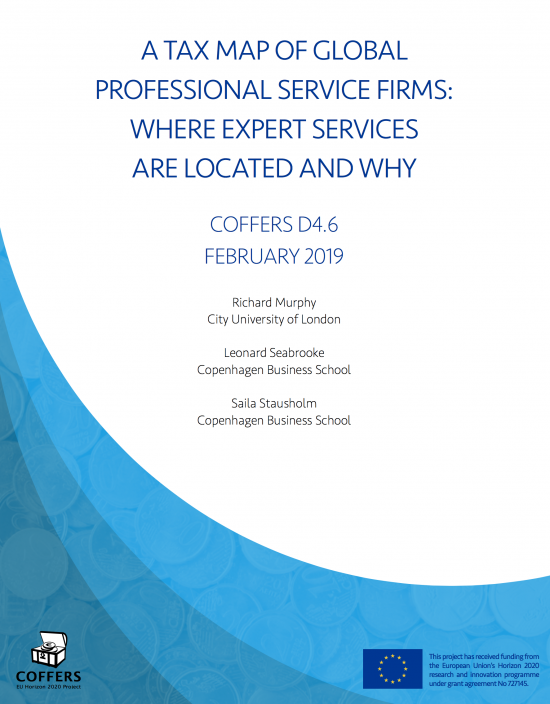I have a new research publication out:
The abstract says:
The role of multi-disciplinary Global Professional Service Firms (GPSFs) in the architecture of international tax abuse has been very little studied. Although it has been known that some of these firms operate in many of the world's secrecy jurisdictions the scale of their activity in these, and other, locations has been little understood. Nor has their own representations of their tax services been appropriately considered. This working paper seeks to redress this deficiency. We locate the activities of these firms in the broader context of their activities around the globe, since it is the boast of many of them that they operate in more than 140 jurisdictions, worldwide. The research has revealed the opacity of the data surrounding these firms, and the unusual nature of their ownership structures. Financial reports of these firms are not available for most jurisdictions in which they work, whilst common control through ownership structures rarely crosses national boundaries. Using global directories of the firms as indication of presence in a location and the number of employees by jurisdiction as an indication of scale, our research indicates the disproportionate activity of particular GPSFs firms, namely the ‘Big Four' accountancy firms, providing tax based services in secrecy jurisdictions. This suggests that they are major suppliers of offshore financial services. We consider the evolution of these GPSFs since the 1990s, suggesting they have been conscious participants in this activity but that their behaviour has adapted over time to reflect prevailing taxation moreÌs to preserve the reputations of those supplying these services. As we show, these moreÌs are reflected in their own presentation of their services as promoted on their web sites, which have changed significantly over time to reflect this fact, with little evidence that there has been any real underlying change in behaviour. As a result we suggest that these firms display a form of adaptive behaviour worthy of further study.
This research will be moving on to be presented in an academic journal paper in due course.
Thanks for reading this post.
You can share this post on social media of your choice by clicking these icons:
You can subscribe to this blog's daily email here.
And if you would like to support this blog you can, here:




I wish you luck and godspeed with this Richard et al. It will be a monumental struggle just to get hold of the information required to understand the scale of the problem, let alone tackle it. Being adrift from the EU is hardly going to make matters any easier. …and it is likely our own government is going to be less than helpful because they are so closely wedded to the interests of the City.
But you’ve made progress against the odds before…..
We will plug on….
Richard I echo Andy’s good wishes for you and your colleagues.
Thanks
But this not the biggest thing I am working on….
Using global directories of the firms as indication of presence in a location and the number of employees by jurisdiction as an indication of scale,”
At various times, this approach would lead a cunning investigator to believe that Chase Manhattan generated a huge chunk of revenue just outside Bournemouth.
Steve says:
“… this approach would lead a cunning investigator to believe that Chase Manhattan generated a huge chunk of revenue just outside Bournemouth.”
…and would that automatically lead to some sort of injustice ?
It’s easy enough to put those horrible GPSF firms out of the tax business.
Drop SDLT, CGT and CT to zero.
They wouldn’t like that at all. The accountants would have to do something else instead. They could work the streets but none of them are very pretty. But there’s vacancies for maths teachers to be filled and they are numerate people.
We make everybody better off and resources get used more productively. It’s not as if there’s an inflation problem at present.
You clearly have no comprehension of tax and its purpose at all
There’s a wealth of literature on good and bad taxes and the ones that tax havens exploit are bad taxes. Switching to consumption taxes ( there’s no justification for 0% tax on food, 5% VAT on energy, and free aviation fuel ) is the way to go if you want to use tax to change behaviours.
Naturally, the applicable amount of benefit claims will have to rise, and the taper rate reduced, so that no-one in the bottom two deciles is worse off.
If the behaviours you want is incentives to use offshore finance ( and one of the big users of offshore is government itself ) then they should make a film called ‘Carry on Potato’ about it.
Ah yes: let’s reward the owners of capital in tax havens by shifting tax from capital to consumption
Or from the wealthiest onto those least able to pay
It really is not very hard to work out your sordid and ethically repugnant agenda
John Fleming says:
“It’s easy enough to put those horrible GPSF firms out of the tax business.
Drop SDLT, CGT and CT to zero.”
What a wonderful suggestion (not).
While we’re at it, why not repeal all our laws and there’d be no crime?
The question seems like one of those ‘Is the Pope a Catholic?’ questions but all credit to you for getting it done.